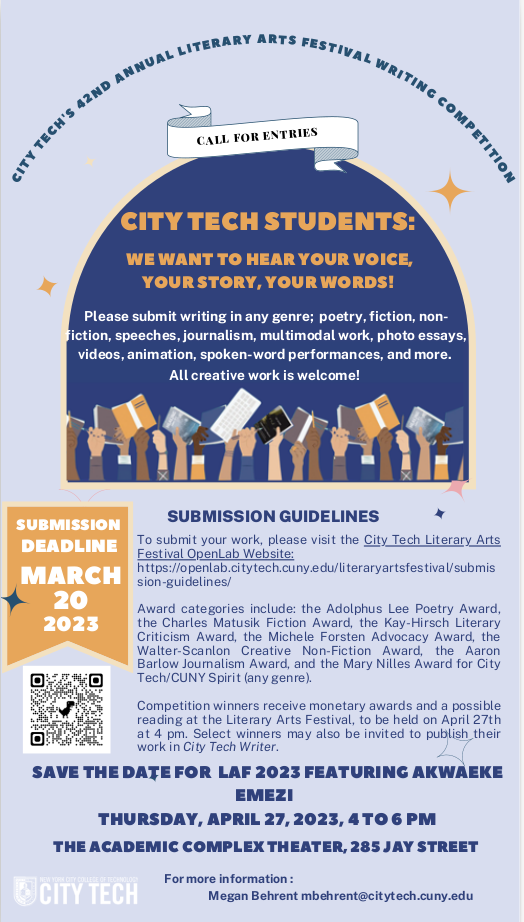I received some questions from folks about graduate school, so I thought that I would post my thoughts here for the benefit of everyone:
General applying advice
- Before going to graduate school, take the time to research if an advanced degree will help you with your career and personal goals. Take the time to answer the question: Why do I want to go to graduate school, and what will an advanced degree help me accomplish? In some careers, a graduate degree won’t necessarily help you. It’s a good strategy to work backwards from job listings to see job requirements for the kinds of jobs that you want to figure out what the education requirements might be. Also, some jobs, like K-12 education might require certifications that are earned separately from a graduate degree. Investigate what schools offer those and how to earn them. NYC Public Schools offers some info about this here: https://www.schools.nyc.gov/careers/teachers/teacher-certification. However, you might have personal reasons for wanting to earn an advanced degree, which is perfectly valid, too. The main point is to have well-thoughtout reasons why you want to make the transition to graduate school.
- Read the application guidelines for each school several times, and read the program requirements–the courses, language requirements, etc.–several times so that you know what will be expected of you to earn that degree.
- Make an application checklist for each school (each will likely be a little different) and check off each item as you get it prepared and submitted.
- Some schools might use their own application system online and others might require you to use Interfolio.com.
- Find out how each school wants you to submit recommendation letters. Most will ask you for the recommender’s contact information, they will contact the recommender, and the recommender will upload or email the recommendation directly to the school.
- When asking for recommendation letters, ask the recommender if they can give you a “strong recommendation.” If so, strategize with that person about what to include in the letter–what do you want them to emphasize? a project? a class? an assignment? Also, tell them the exact name of the program you applying for, a link to that program’s website, and what your goals for the program (what do you imagine you would like to focus your studies on?) and your goals after graduation (what will you use the MA to do–get a specific kind of job, apply for a PhD program, etc.).
- Spend lots of time polishing your writing samples. They should demonstrate your research, analytical, and reasoning skills as much as your writing ability. Make sure citations are correct. Have your writing samples meet the requirements for the application (some ask for no more than 5000 words, for example). Use the writing process (draft, feedback, revise) multiple times with feedback from different people (family, friends, peers) to improve your writing.
- Not all schools accept GRE scores, but those that do might weigh the score heavily in your admission, so invest time in studying and test practice so that you do your very best on the exam. There are also cram schools/test prep schools that offer courses to help you do well on the exam. If you can afford these, it could improve your score.
- Since you’re leaving City Tech with a non-literary degree, you’ll want to account for that in your application materials. Say things like the PTW degree gave you important writing, analytical, and research skills that can be applied to any domain, including English literature. Then, talk about what you’ve done outside of the PTW program to prepare for an English MA–literary works that you have read, periods that you focus on in your reading, other classes and what you might have learned in them in regard to English literature. If you have an interest in a specific genre of literature for your graduate degree, you should mention that, too. For example, Science Fiction, Campus Novels (about academia), Office Fiction (about workplaces and our social relationships in them), and Law through Literature (stories in which the narrative turns on points of law, the legal system, or the legal profession) all have points of connection with PTW.
- Remember, just like looking for a job, you are making an argument to each of the graduate programs that you deserve a place in their program. Contend that you are best because of some reasons–you’ve done a lot to prepare yourself for this challenge, you have a unique perspective and background that will enrich the program for all students, you have goals for yourself that can only be accomplished by successfully completing a degree in their program, etc. There are many sample letters a Google search away, so dig around online and look for books on the subject, too, such as Donald Asher’s Graduate Admissions Essays, Fourth Edition: Write Your Way into the Graduate School of Your Choice or Colleen Reding’s Grad’s Guide to Graduate Admissions Essays: Examples From Real Students Who Got Into Top Schools.
- If you’re missing some important part of the application, such as languages, you should reach out to the program coordinator to ask if you can take language courses while in the MA program or if you should take language classes before entering the program as most programs that have language requirements will give you a test on your language ability (again, look at the program requirements).
- Every program will have different options for financial aid. Some might include scholarships, teaching in exchange for tuition and a stipend, or a combination of these. You might qualify for consideration of these during your application, but there might be others you need to apply for separately. When in doubt, check with the program director. Also see this page on Federal Student Aid about FAFSA and a “grad school prep checklist”: https://studentaid.gov/resources/prepare-for-college/checklists/grad-school. Avoid loans unless you’ve done the math and know that the job you want requires the degree you need and the wages of that job will provide you enough money to pay back the loan quickly (ensure there are no early payment penalties) while giving you enough to afford the life that you want. Also, there are some federal loan forgiveness programs, but you should understand that they likely will require effort on your part to avoid mistakes, catch errors on the servicer’s side, and advocate for yourself to have the terms honored.
- An important part of life after undergrad graduation with a job or graduate school is budgeting. Avoid accruing debt on a credit card. Plan ahead for expenses. Save money when you can. Recent advice on this can be found here: https://www.wsj.com/articles/to-stop-living-paycheck-to-paycheck-they-spill-about-it-on-tiktok-28d659a2?mod=hp_lead_pos9.
Harvard English Graduate Programs Admissions (PhD, MA for PhD students)
https://english.fas.harvard.edu/guidelines-admissions
Yale Admissions (1 year MA and 6 year PhD)
https://english.yale.edu/graduate/applying-yale
CUNY Graduate Center (PhD only)
https://www.gc.cuny.edu/english/admissions-and-aid
CUNY City College (MA)
https://www.ccny.cuny.edu/admissions/english-literature
CUNY Brooklyn College (MA English and MA English Teacher Programs)
http://www.brooklyn.cuny.edu/web/academics/schools/socialsciences/departments/english/graduate/ma.php
CUNY Hunter College (MA in Literature, Language, and Theory)
https://www.hunter.cuny.edu/english/graduate/majors
Other CUNY MA in English Programs
https://www.york.cuny.edu/english/student-resources/graduate-school-resources
GRE Test Prep Books
- ETS (test maker) Resources, https://www.ets.org/gre/test-takers/general-test/prepare.html
-Princeton Review GRE Premium Prep, 2023: 7 Practice Tests + Review & Techniques + Online Tools (Graduate School Test Preparation)
by The Princeton Review - GRE Prep Plus 2023, Includes 6 Practice Tests, 1500+ Practice Questions + Online Access to a 500+ Question Bank and Video Tutorials (Kaplan Test Prep)
by Kaplan Test Prep - GRE Prep 2023 For Dummies with Online Practice
by Ron Woldoff




